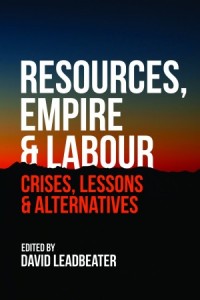Claudia Sanchez
Staff Writer
David Leadbeater, associate professor at Laurentian University, presented his new book, Resources, Empire and Labour: Crises, Lessons and Alternatives, to the USF community on Oct. 15 and led a discussion with international studies professors Chris Loperena and Anne Bartlett surrounding the global mining boom and how the boom has led to violent conflict, protest, and social disruption. The event also informed the community about new research on the crises and the actions that local communities around the world are taking to address the situation.
The event was sponsored by the Environmental Studies department, the M.A. International Studies department, the Latin American Studies department, Center for Latino Studies in the Americas, and Media Studies department and hosted by Media Studies professor Dorothy Kidd.
Leadbeater said that the cover art, an image of the Rocky Mountains in front of a sunset, was chosen to symbolize the book’s main question, “Will the planet burn or survive?”
The book, which is composed of 23 authors’ works, focuses on mining and its effects on the environment, mining workers, and indigenous communities. The issue of mining is highly important and familiar to Kidd and Leadbeater because they grew up among the mining industry in Canada. As a result, they’ve become experts on mining and its effects on politics and globalization.
The speakers elaborated on the displacement, genocide, and environmental issues caused by mining and other environmentally intrusive ways of resource extraction.
Leadbeater focused on the economic and environmental issues with mining. He explained that mining and all extracting industries are ultimately bad for the environment because they waste resources, lower economic growth, and do not sufficiently pay its employees.
He adds that mining is “genocidal in its development” because of the destruction and diaspora it causes in indigenous communities.
Leadbeater thinks that the only way to reform and improve the mining industry is to “make sure it is transparent and pure from imperialism.” Regulating the industry would decrease corruption prices and profits as well as decrease poverty and the destruction of resources.
He concluded his speech by saying, “We have possibilities to improve the world by decreasing mining,” but admitted that it would be difficult because “it’s expensive to recycle [mined materials] and cheaper to get virgin material.”
Kidd explained that when viewing cases of mining exploitation and destruction, one should “follow the money,” meaning that people should look for warning signs. These warning signs are environmental degradation, rapes and violence inflicted on the native people of the area, a decrease in local or national power, a subsequent increase in investor power, and attacks on journalism.
Kidd added that the popular media was more business-oriented, and barely focused on the social movements behind mining. It is difficult for indigenous activists to find a voice in the mining debate because “racism has stopped alliances between labor, environmental, and aboriginal [indigenous] movements.”
Bartlett spoke about mining in northern Darfur, which is currently facing a mining genocide. Mining has increased the country’s death rate as well as created displacement, enclosure, and has, in some cases, forced indigenous people into refugee camps.
Loperena focused on mining and tourism in Honduras, and the negative effects on the nation’s resources. Mining and tourism started in 1999 when Hurricane Mitch destroyed Honduras’s crops and economy. Since then foreign countries have begun to control tourism and mining in the country, which has led to the destruction of ecosystems and indigenous communities due to resorts and mining. Ultimately, tourism is run like the mining industry; it is a kind of “greenwashing,” an environmental destruction hidden as environmental sustainability.

